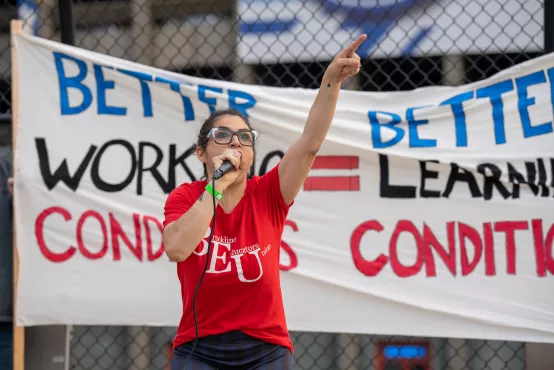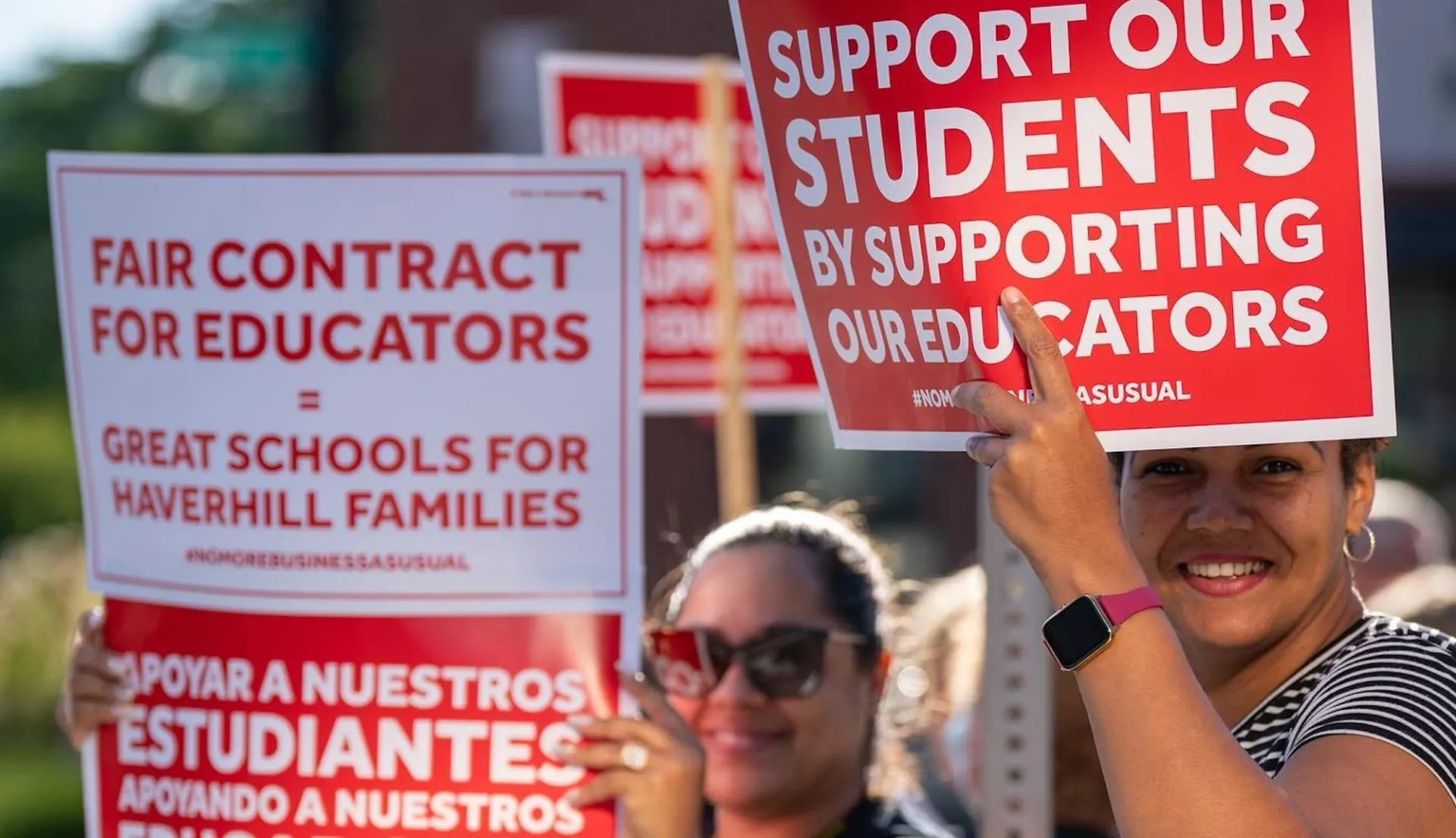
Key Takeaways
- Like an increasing number of Americans, Bay State educators see the power of union action, says MTA President Max Page.
- Their wins? Better pay for the lowest-paid educators, paid family leave, more mental-health supports for students, and more.
- They hope they can inspire educators across the country to get organized and stand up for educators and students.
This year, Holly Currier was paid about $30,000 as an instructional assistant in Andover, Mass., the 19th richest town in the nation’s second richest state.
And yes, it’s a full-time job.
Every day, Currier is in seven high school social studies classes, supporting the physical, academic, emotional, and social needs of students who have special education plans. In some classes, she has many as a dozen students on her caseload. On the toughest days, it’s just about helping them get through the door.

Currier’s mother is an Andover instructional assistant, too—who is currently facing some tough choices. She can’t afford to continue living in the Andover home that she shared for years with her now-deceased parents. She also can’t afford to retire. “She may not be able to remain here. We really don’t know,” says Currier.
A couple of years ago, for Currier and other Andover paraeducators, it came down to a simple choice: Either quit or fight.
They decided to fight. And that fight culminated last year in a 5-day strike by Andover Education Association (AEA) members that won transformational pay raises for the district’s lowest-paid classroom educators.
“I know the politically correct thing is to say, ‘nobody wants to go on strike,” says Currier. “But if you’ve been dealing with what we’ve been dealing with, yeah, I did want to! Because I knew it would work!”
A Wave of Strikes
Andover’s union members are among a wave of Massachusetts Teachers Association (MTA) members who have gone on strike recently. The first recent strike took place in 2019 in Dedham. Since 2022, six additional MTA local unions have followed, including Newton, which held an 11-day strike last month. A seventh local (Melrose) took a strike vote but settled within 24 hours.
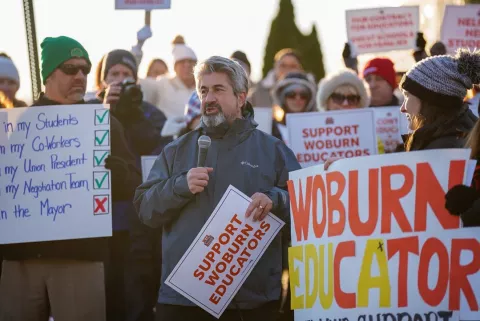
Like an increasing number of Americans, Bay State educators see the power of union action, says MTA President Max Page. The energy of “Red for Ed” in 2018—when educators in states like West Virginia and Arizona took to the streets to demand more resources—and, even before that, the 2012 teachers strike in Chicago that led to a 17 percent pay raise and stopped an effort to tie raises to student test scores, was noticed in Massachusetts.
“The way I think about it is, I think there is a growing respect for unions and for unions taking action on behalf of union people,” says Page. And it’s not just MTA members—in 2022, U.S. approval of labor unions reached its highest point since 1965.
For many years, MTA members have “been building more active, more engaged locals that build contract campaigns,” says Page. “Most don’t lead to strikes, obviously. But some have run into school committees with high-priced, union-busting lawyers, and they feel they need to take that strike.”
In Massachusetts, elected school boards are known as committees. As Page notes, many of these boards have moved away from in-house attorneys, instead hiring the same Boston law firms to do their negotiating with teachers.
“The most fundamental issue [for educators] is respect,” says Page. “That respect takes the form of pay, of paid leave, of mental-health professionals in schools, and so on. There are different forms, but it’s all fundamentally about whether you respect me as an educator. And those lawyers are so disrespectful and disdainful.”
Page also notes that for every Massachusetts local that has gone on strike, there are plenty that have prepared to—but found it unnecessary. Instead, they’ve gotten the contracts they deserve at the bargaining table.
What are they winning?
In Andover, starting pay for instructional assistant (IAs) has gone from $24,537 to $39,142. By the end of the contract, the highest paid IAs will be earning $50,103—or almost $10K more than before.
“It’s a significant material gain for those workers—and a statement that we’re not going to allow public schools to operate on the exploitation of this workforce,” said Andover Education Association President Matt Bach, who notes that almost all IAs are women and many are People of Color.

Similarly, in Newton, Mass., where union members went on strike after 16 months at the bargaining table, starting wages for teaching aides and behavioral therapists are increasing 30 percent—from $27,000 to $36,778.
These are life-changing pay raises—and they’re not the only thing that Massachusetts union members have won. Family leave is another.
Unlike many other states, such as Minnesota (which provides 12 weeks of paid family leave for educators), or Delaware (also 12 weeks paid) or even South Carolina (six weeks paid), Massachusetts doesn’t have a statewide law or policy on providing paid family leave to public employees.
So, it’s up to local unions to negotiate. In Newton, “a modern, humane parental leave” was a top priority, says Ashley Raven, a Newton preschool teacher and union leader. Through the strike, Newton educators won up to 60 days paid. In Malden last year, the same. In Andover, they won eight weeks. “Paid parental leave is a basic human right,” says Currier, “but we would never have seen it otherwise [if we hadn’t gone on strike].”
Another priority? More mental-health supports for students. In his Newton classroom, high school history teacher David Bedar has had “six or seven kids, out of 45, be hospitalized at various points in the year,” because of suicidal thoughts or attempts, he says. “It’s horrible. And it shouldn’t happen.
“The district [stated] that they also care about mental health, and it was like, ‘okay, I’m glad you agree. What are you going to do about it?’” recalls Bedar. “We were fighting tooth and nail for these issues.” Through the strike, union members won additional school social workers for Newton’s students, ensuring that every one of the district’s 22 schools would have at least one.
Hear Ashley Raven: On the need for mental-health supports
Elapsed time: 0:00
Total time: 0:00And that’s not all. The Massachusetts strikes have won lower class sizes, increased planning time and smaller special-ed caseloads, and even the establishment of working groups to address workforce diversity and affordable housing.
They also have experienced the joy of standing up for themselves—and their students, union members say.
What’s Next?
Strikes by public employees are illegal under Massachusetts law, which means local unions typically incur hefty fines for striking. But that might change in the future.
As it is, the high-priced attorneys representing school committees at the bargaining table don’t have any incentive to quickly come to a fair agreement. Indeed, “they love it when these things drag on for years,” notes Page. They’re getting paid! Newton union members bargained for 16 months before taking a strike vote, he notes.
These delay tactics are harmful and common—and because of them, MTA members are pushing for a new law that would enable educators to legally strike, after bargaining “in good faith” for six months. “People find that [idea] to be very reasonable,” says Page.
Massachusetts union members also are looking toward school committee elections, which take place at the end of March. Last weekend, Andover instructional aides canvassed voters to help get candidates who also are parents and educators elected to their local school board “It won’t change everything, but it would be helpful to have an educator voice on the committee,” notes Currier.
With their efforts—and their wins—these Massachusetts union members also hope that they have inspired colleagues around the nation to get organized. “Yes, our focus was on the students and educators of Newton, but [we also hope] the effects of this contract will have ripple effects throughout Massachusetts and the nation. Educator voices are powerful when we stand together,” says Raven.
Says Currier, “In my mind, even when the challenges we’re facing are enormous, fighting is always the better option.”
A Timeline of Recent Massachusetts Strikes
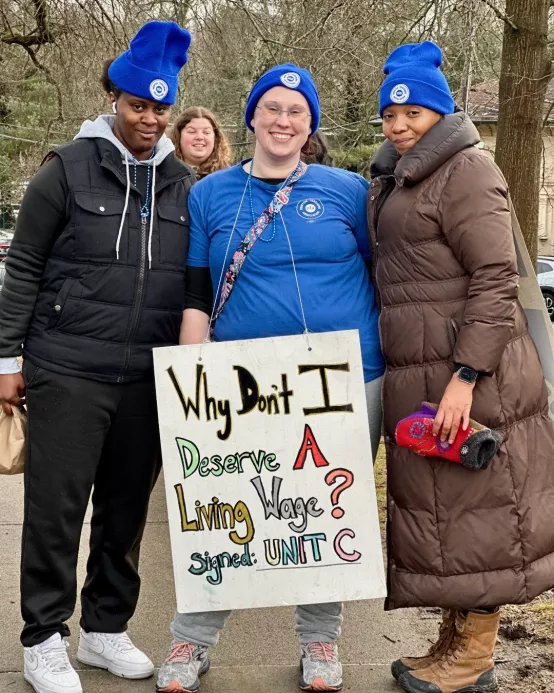
11-Day Strike, 1/19/24-2/4/24
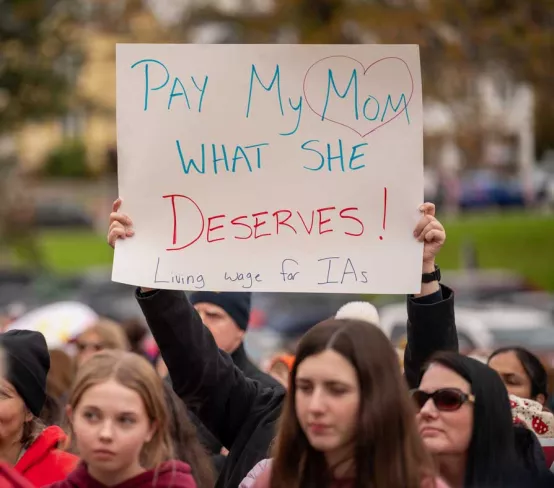
5-Day Strike, ended 11/14/23
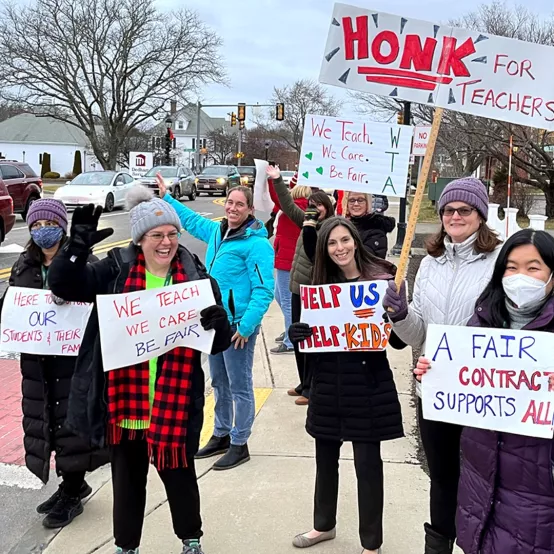
7-Day Strike, 1/30/23-2/5/23
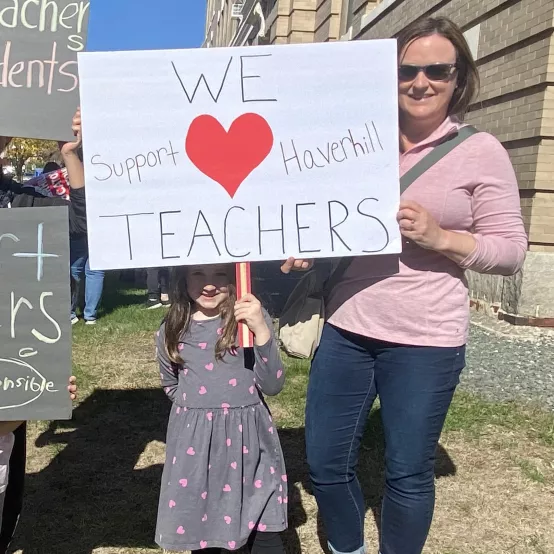
4-Day Strike, 10/16 to 10/20/22
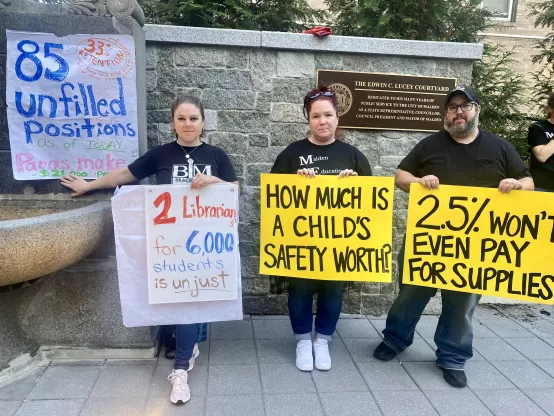
1-Day Strike, 10/16/22
